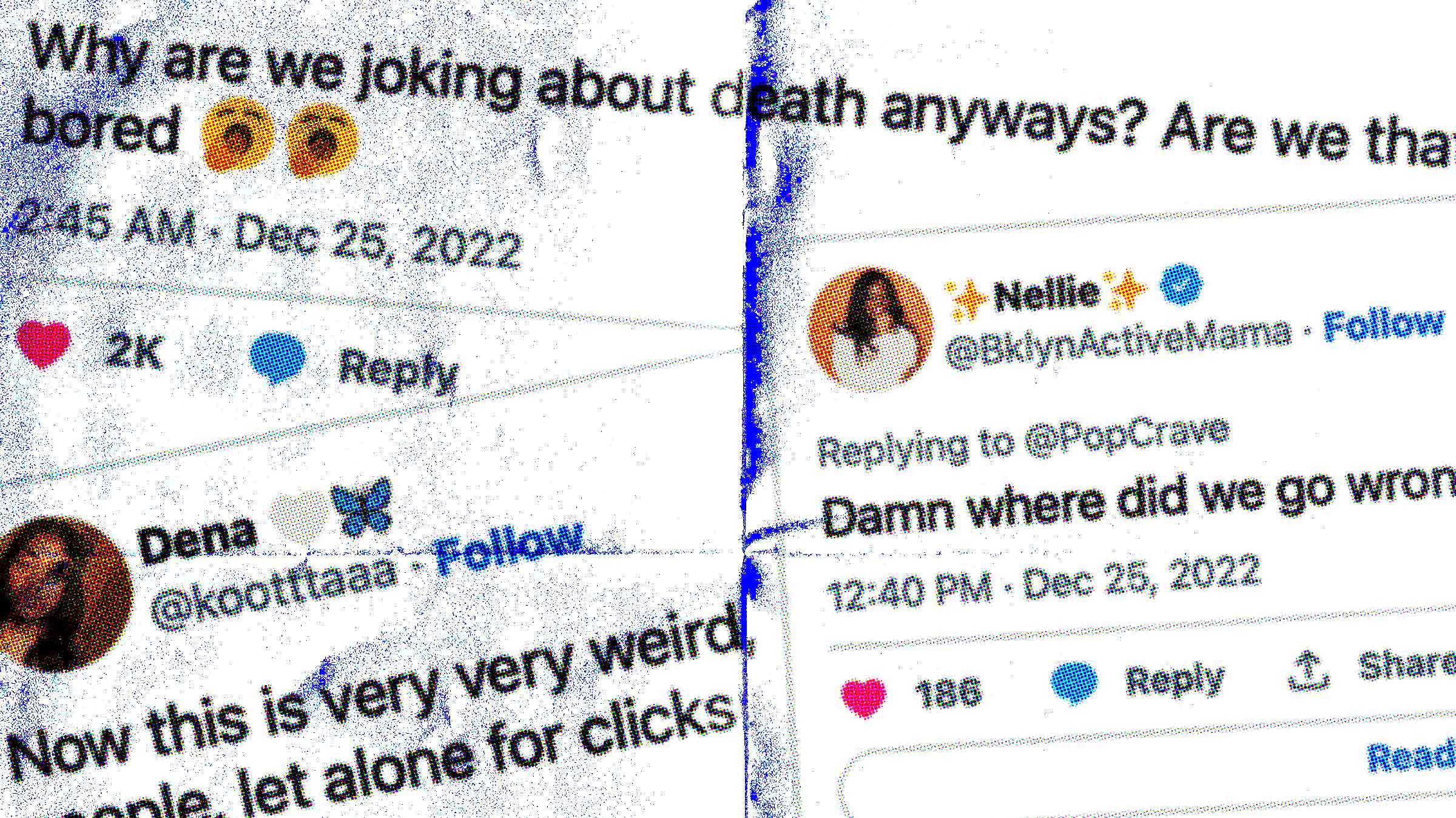TikTok’s Celebrity Death trend left the internet divided, signaling the latest generational disconnect on what society finds funny
Sick, disgusting, and unsettling are just a few of the many choice words directed at TikTok’s latest phenomenon—the “Celebrity Death” trend. You’ve probably seen plenty of renditions. But for those who haven’t, it typically goes like this: “Oh my god! [Insert the name of your target’s favorite singer or actor or miscellaneous star], dead at [insert their current age]!”
Here’s a textbook example: “Bruce Springsteen, dead at 73!” TikTok user @nataliekruse exclaims, sending the middle-aged women around her into a state of utter disarray. “Pls watch till end omg,” reads the video’s caption. “I just ruined Bruce Springsteen’s biggest fans Christamas. #christmas #christmaseve #brucespringsteen #newjersey.”
The Celebrity Death trend exploded over the holidays, with bored kids eager to make victims of their parents. But in the days just following December 25, Twitter got mad—the general sentiment being that death is nothing to joke about, and that something is very, very wrong with our youth. More recently, so did certain celebrities; Andy Cohen, for instance, said that he’s “scared enough of dying in reality without having to watch bizarre simulations of it over and over again.”
It’s a fair enough point, if perhaps a bit too condemnatory. Some of these videos are objectively funny, in the sense that lying itself is often objectively funny—especially when we, as the audience, are in on the secret. It’s a staple of reality television: Real Housewives reunions, where cast members deny having talked shit, despite the fact that everyone has already seen it. (“I never said that!” they cry, just before the producers play it back on-screen—the specific, damning moment where they did, in fact, say exactly that.)
“Humor is an ever-changing thing that develops in response to an infinite array of societal factors.”
Writer Sadhbh O’Sullivan interviewed one TikToker on what she calls her “lying era.” “I’d make something up about my past like, ‘Oh my god do you remember that time I bumped into Kim Kardashian on the underground?’” she divulged. “It’s basically like storytelling. I’m writing my own episode in front of my own eyes. It’s quite fun.” In another video captioned “telling my family lies to see how they respond,” @jen.hendance07 makes up complex and meaningless tales (fake current events, things she “learned” at school) which her parents can’t decide whether or not to trust (clearly, not their first rodeo). “I still can’t believe the story of Adam Dwell,” she says, pretty convincingly. “You don’t know? He’s the astronaut that literally got lost in space… Are you living under rocks?” She goes on and on, reading them verified “articles” from Snopes and rattling off the details of Adam Dwell conspiracy theories.
The takeaway is that—like it or not—lying is fast becoming an established facet of Gen Z humor. And it’s always been part of comedy, especially in the stand-up scene. Screenwriter David Misch compared it to religion: “In one, accept the premise and get a laugh; in the other, accept a higher power and get eternal life.” He quotes an old Louis C.K. set-up: “I went to a bar the other night. Where isn’t important, because I’m lying.”
Of course, the contexts are quite different. In both cases, being in on the lie is its own delight. But with stand-up, it’s something you excuse—a suspension of disbelief for the sake of entertainment. On TikTok, it’s not for the sake of anything. Lying is the joke in and of itself. And as time goes on, it seems like the most senseless deceptions go the furthest. I’m thinking, for example, of that girl who found a Marc Jacobs sweater in the thrift store, tags still attached, and posted it to Instagram. “No Cuz Marc Jacobs donates a lot of his stuff… bc he use to be poor and only thrift, I didn’t know he still did that,” read a reply in the comments. “Aw that’s so sweet actually,” responded another. Then the cincher, which quickly became a viral meme: “Ikr ! But I made that up i just felt like lying.”
This isn’t to excuse the Celebrity Death trend, which, for a variety of reasons, was bound to offend and confuse. But humor is an ever-changing thing that develops in response to an infinite array of societal factors; in this case, today’s blanket atmosphere of chaos and uncontrollability—catalyzed by things like climate change, global pandemics, political polarization, and runaway inflation—had a heavy hand in rendering pointlessness very funny. It’s generational, it’s cultural, and it’s less an indicator of the character of TikTokers than a metric of truth’s grand unraveling.



















